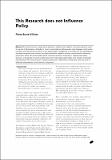| dc.contributor.author | Scott-Villiers, Patta | en |
| dc.date.accessioned | 2016-01-07T13:36:41Z | |
| dc.date.available | 2016-01-07T13:36:41Z | |
| dc.date.issued | 2012 | en |
| dc.identifier.citation | Scott-Villiers, P. (2012) This Research does not Influence Policy. IDS Bulletin 43(5): 25-30 | en |
| dc.identifier.issn | 1759-5436 | en |
| dc.identifier.uri | https://opendocs.ids.ac.uk/opendocs/handle/20.500.12413/7523 | |
| dc.description.abstract | This article concerns a study whose questions, methods and analytical conclusions were the work of a group of Karimojong in Uganda. Its report included text and photographs, plain language, direct voices and faces, and little theorising. When it was disseminated it appealed to local people and to a development consultant concerned with inclusion, but was dismissed as useless by a donor concerned with influencing government policy. This article looks beyond social discrimination and power in understanding these reactions, and explores the communicative encounter itself, asking what makes work relevant, meaningful and influential? This research doesn't influence policy, but it does influence local action and the work of reflective intermediaries which, after all, is important. | en |
| dc.format.extent | 6 | en |
| dc.publisher | Blackwell Publishing Ltd | en |
| dc.relation.ispartofseries | IDS Bulletin Vol. 43 Nos. 5 | en |
| dc.rights.uri | http://www.ids.ac.uk/files/dmfile/IDSOpenDocsStandardTermsOfUse.pdf | en |
| dc.title | This Research does not Influence Policy | en |
| dc.type | Article | en |
| dc.rights.holder | © 2012 The Author. IDS Bulletin © 2012 Institute of Development Studies | en |
| dc.identifier.doi | 10.1111/j.1759-5436.2012.00359.x | en |

